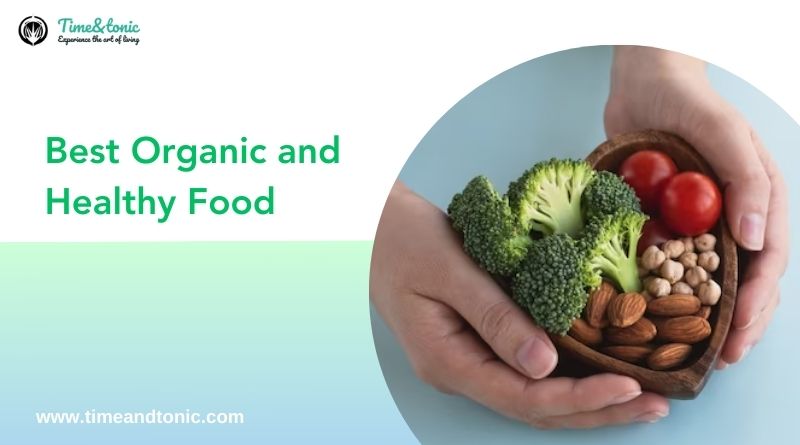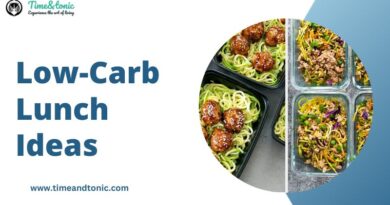Nourishing Your Body with the 4 Best Organic and Healthy Food
Best Organic and Healthy Food – In an age where health-conscious choices have become paramount, the quest for the best organic and healthy food has taken center stage. The modern discerning consumer, armed with knowledge and a keen desire for well-being, is seeking more than just sustenance.
The term “organic” doesn’t merely denote a label; it represents a lifestyle, a commitment to a healthier planet and a nourished body. As we navigate the complex landscape of food options, the significance of embracing organic and healthy choices cannot be overstated.
This comprehensive guide serves as a beacon, illuminating the path toward the best organic and healthy food options available. Here, we delve deep into the realms of organically grown fruits and vegetables, whole grains, sustainable meats, and dairy alternatives. Beyond mere consumption, this guide explores the very essence of what makes a food item truly organic and healthy, dissecting certifications and eco-conscious practices.
Join us on this enlightening journey, as we unravel the wonders of organic and healthy living. Discover not just what to eat, but why to eat it, and embark on a transformative expedition toward a healthier, happier you. Embrace the best organic and healthy food choices; your body, the environment, and your taste buds will thank you.
What Makes Food Organic and Healthy
Understanding the distinction between organic and conventional foods is pivotal to making informed, health-conscious choices. Let’s delve into the characteristics that define food as organic and healthy, shedding light on why these choices are paramount for our well-being.
Organic Foods

- No Synthetic Chemicals: Organic farming prohibits the use of synthetic pesticides, herbicides, and genetically modified organisms (GMOs). Instead, natural alternatives like neem oil and compost are utilized, ensuring the absence of harmful residues in the final produce.
- Environmentally Friendly: Organic farming practices prioritize soil health, crop rotation, and biodiversity, preserving natural ecosystems and promoting sustainable agriculture. By avoiding chemical fertilizers, these methods protect water sources and wildlife habitats.
- Non-GMO: Organic foods are free from genetically modified organisms. GMOs are altered at the genetic level, a practice avoided in organic farming to maintain the integrity of the crop’s DNA.
- No Antibiotics or Hormones: Organic animal products come from animals raised without the use of antibiotics or growth hormones. This translates to meat, dairy, and eggs that are free from artificial additives, promoting better animal welfare and healthier consumption for humans.
Also Read: Low Carb Dinners for Vibrant Living
Healthy Foods

- Nutrient Density: Healthy foods are packed with essential nutrients like vitamins, minerals, and antioxidants. These nutrients are crucial for bodily functions, supporting everything from immune health to energy production.
- Balanced Macronutrients: Healthy foods provide a balance of carbohydrates, proteins, and fats. Whole grains, lean proteins, and good fats (like those found in avocados and nuts) form the foundation of a balanced diet, sustaining energy levels and supporting various bodily processes.
- Low Processed Sugar and Salt: Healthy foods are low in processed sugars and salts, which are linked to various health issues like diabetes and hypertension. Opting for natural sources of sweetness (like fruits) and using herbs and spices for flavor can significantly enhance the health quotient of any dish.
- Minimal Processing: Healthy foods are minimally processed, retaining their natural goodness. Processing often strips foods of their nutrients, making whole, unprocessed foods the ideal choice for optimal health.
Best Organic and Healthy Food Options
When it comes to organic and healthy foods, a diverse array of options awaits, catering to various tastes and dietary preferences. Incorporating these choices into your diet not only ensures a nutrient-packed meal but also supports sustainable agriculture practices. Here are some of the best organic and healthy food options to consider:
Also Read: Low Carb Midnight Snacks
1. Organic Fruits and Vegetables
Organic fruits and vegetables are nature’s culinary treasures, cultivated with care and without synthetic pesticides or GMOs. Bursting with vibrant flavors and essential nutrients, these wholesome delights provide an array of health benefits. Rich in antioxidant, vitamins, and minerals, they boost the immune system, promote radiant skin, and aid in digestion.
What sets organic produce apart is its commitment to preserving ecosystems and biodiversity. By choosing organic fruits and vegetables, consumers not only enjoy fresher, pesticide-free options but also contribute to sustainable agriculture. Each bite is a celebration of health and environmental stewardship, aligning taste with ethics for a truly enriching culinary experience.
2. Organic Grains and Legumes
Organic grains and legumes stand as the foundation of a wholesome, balanced diet. Cultivated without harmful pesticides or genetic modifications, these nutrient-dense wonders offer a wealth of health benefits. Quinoa, rich in complete proteins, fuels the body with essential amino acids, while brown rice provides sustained energy and vital minerals.
Lentils, packed with protein and fiber, aid digestion and support heart health. Chia seeds, a superfood, deliver omega-3 fatty acids and antioxidants. By choosing organic grains and legumes, individuals embrace a diet abundant in fiber, promoting gut health and lowering cholesterol. Moreover, these organic marvels nurture both the body and the planet, fostering a sustainable food future.
3. Organic Dairy and Alternatives
Organic dairy and plant-based alternatives redefine indulgence with their wholesome goodness. Organic milk, sourced from cows raised without antibiotics or hormones, offers a calcium-rich elixir, essential for strong bones and teeth. Organic yogurt, teeming with probiotics, nurtures the gut microbiome, enhancing digestion and immunity.
Plant-based alternatives like almond and soy milk provide lactose-free, cholesterol-free options, catering to diverse dietary needs. Fortified with vitamins and minerals, they ensure a creamy delight without compromising nutrition.
Choosing organic dairy and plant-based alternatives not only prioritizes personal well-being but also supports ethical farming practices and environmental sustainability. With every sip and spoonful, consumers embrace a delectable, guilt-free journey towards a healthier, kinder world.
4. Organic Meat and Seafood

Organic meat and seafood stand as epitomes of ethical, high-quality culinary choices. Organic meats, sourced from animals raised on organic feed without antibiotics or growth hormones, offer lean, flavorful cuts. Grass-fed beef, with its balanced omega-3 and omega-6 fatty acids, ensures a healthier heart, while organic poultry promises tender, succulent bites.
On the seafood front, wild-caught varieties like salmon and sardines boast omega-3 fatty acids, promoting brain health and reducing inflammation. Choosing organic meat and sustainable seafood not only guarantees exquisite taste but also supports animal welfare and marine ecosystems. With each savory bite, consumers savor not just a meal but a commitment to health, ethics, and the environment.
Also Read: 9 Best Grocery Store Finds
In the vibrant tapestry of organic and healthy foods, our choices reverberate beyond the dinner table. By embracing these nourishing options, we not only fortify our bodies with essential nutrients but also cultivate a sustainable, compassionate relationship with our planet. Organic fruits, vegetables, grains, dairy, and meats offer a delectable journey toward well-being, while safeguarding ecosystems and promoting ethical practices. Let our daily meals echo a harmonious mantra, celebrating health, flavor, and environmental stewardship in every bite.
FAQs
Research suggests organic foods can have higher levels of certain nutrients and antioxidants. However, the primary benefit lies in avoiding harmful chemicals found in conventional foods.
You can find organic options in local farmer’s markets, dedicated organic grocery stores, and even mainstream supermarkets. Online platforms also offer a wide range of organic products.




